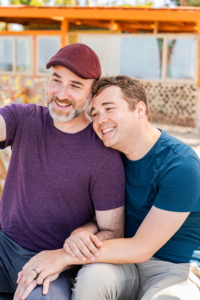In January, we reflected on seven milestones and lessons from the last shmita cycle as we also look forward to the next. Our sixth reflection below shares our learnings as we have built and fostered philanthropic partnerships to increase influence and grantmaking impact.
“A community is too heavy for anyone to carry alone,” says the Midrash, an ancient Jewish commentary. At Leichtag Foundation, we understand this as guidance about our shared responsibility for the issues we look to address through our grantmaking, programming, and communications. Over the past seven years, philanthropic collaborations have been key as we launched programs, developed, and oversaw field-building efforts, and incubated new initiatives and organizations.
We have learned much about developing and managing funder partnerships to maximize results and make the most of the time, effort and resources spent. We know that alliances offer many benefits over pursuing the work alone, including:
- Greater financial resources to enable larger investments and/or more awards over longer periods.
- Cost efficiencies due to shared strategy development, research, grantee due diligence, communications, and reporting.
- Access to new networks and spheres of influence, including individual and institutional funders, government agencies, businesses, and nonprofits.
- Opportunities to learn from partners with different areas of expertise.
At the same time, collaborative grantmaking has the potential to involve a great commitment of time and attention, even for efforts that entail small financial commitments. A productive partnership requires thoughtful planning to decide a structure and process that meets the needs, expectations, and ability of all partners. It also requires alignment around a definition of success.
Keys to Success
Below are the practices we believe lead to positive, productive partnerships.
- Approach collaborations with organizations and/or individual donors where strong, trusting relationships are already in place and there are shared values. Involve those with decision-making authority from the outset.
- Document the amount of time, funding, and other resources each partner will commit and a time horizon for the collaborative.
- Ensure alignment on strategy, time dedicated to learning, grantmaking speed, impact measurement, and potential new partners. Funders should also agree on issues of confidentiality, project publicity and how the contributions of members will be recognized.
- Find distinct roles for each funder. Often, it is most efficient for one funder to take the lead. The group can also assign other roles; for example, one may manage scheduling and setting meeting agendas, another communication, and another evaluation and reporting. This allows funders to balance contributions and focus on their strengths.
- Adopt clear structures and processes for various parts of the work, including gathering data, grant review and approval, and award distribution.
- Adapt to new findings, changing circumstances, and expectations.
- Commit to robust internal and external communications and opportunities for feedback.
However, even when all the above takes place, collaboratives can face challenges. Funder priorities and available resources can change over time. Participants may want to assume different roles and responsibilities. It is also common to experience program fatigue. To maximize the chances of success, it is important to recognize hurdles; make needed changes; and reflect on, share, and incorporate lessons learned.
Through our implementing partner organization Impact Cubed, we have managed a number of funder collaborations over the years. Here are a few examples.
COVID-19 Response
Early in the pandemic, we helped to launch two collaborative emergency response funds with local community organizations. Each funding partner contributed financial and staffing resources. Partnerships enhanced our capacity to educate a larger pool of donors, which resulted in attracting more resources from individuals and institutional funders. With such support, both funds provided self-sufficiency and capacity building grants for two and a half years as well as directed increased funding through aligned channels.
The pooled funds maximized efficiencies and streamlined nonprofits’ fundraising efforts. For each fund, nonprofits had one point of contact who represented the collaborative. With more staff involved our network of relationships was enhanced and we were able to match grantees with someone they already trusted and who understood their organization. Working within existing relationships also allowed us to collect less grant data and do so by phone and email, rather than require lengthy, formal applications. This approach allowed nonprofits to spend their time where it was needed more – on the care of their clients and members.
The Coastal Community Foundation, Leichtag Foundation and Rancho Santa Fe Foundation created the North County COVID-19 Response Fund. Frontline nonprofits received emergency resources to aid thousands of vulnerable residents who were suddenly unable to meet their basic needs. Grants enabled children to study in safe distance learning programs with the adult attention, healthy food, and quality technology not available to them at home. Funding also addressed the drastically increased need for mental health supports. More than $1.3 million was distributed through 70 grants with an added $720,000+ leveraged for related needs from allied donors.
The Jewish Federation of San Diego County, Jewish Community Foundation of San Diego and Leichtag Foundation established the San Diego Jewish Community COVID-19 Emergency Fund to provide coordinated, streamlined support to the most vulnerable and affected in our Jewish community. The Fund distributed nearly $3 million via 200+ grants and loans, which helped community members meet their basic needs, allowed for safe work and community spaces, and supported virtual and outdoor programming. Read more in the latest Fund Report.
Jerusalem Philanthropic Initiatives
Jerusalem Philanthropic Initiatives (JPI) advances civil society and philanthropy in Jerusalem by forging cross-sector partnerships with organizations, funders, and other stakeholders. Responding to great need and demand, JPI magnifies and helps realize the city’s opportunities for social cohesion, diversity and inclusion, and transformational change. JPI develops the capacity of organizational leaders, and enhances Jerusalem-based programming, including immersive experiences.
The Jerusalem Model, a JPI project, is built on a shared principle that Jerusalem’s diversity is not a fatal flaw, but a precious asset. Participants include activists from a range of backgrounds, including Ultra-Orthodox, traditional, and secular Jews, Palestinian Muslims and Christians, Ethiopian Israelis, and members of the LGBTQ community. Through small grants, conferences, guided working groups, peer support, and other personal and professional development opportunities, participants gain the skills needed to effect positive civic change. For details about Leichtag Foundation’s work in Jerusalem during the pandemic, see this eJewish Philanthropy article.
Jews of Color Field Building Initiative
The 2014 killing of Michael Brown in Ferguson, Missouri and too many similar incidents prompted us to explore combatting racism and uplifting Black voices in our own communities. In 2016, along with partners, we convened a group of Jews of Color leaders to hear their stories. They revealed severe resource inequities for Jews of Color, including lacking leadership and professional development opportunities, exclusion from Jewish communal participation, and more.
In response, the Jews of Color Field Building Initiative was formed by a group of funding partners that soon expanded to include other foundations.. The initiative included the first participatory grantmaking fund of its kind – philanthropic dollars for Jews of Color stewarded by Jews of Color.
After an initial incubation period by Impact Cubed, the Jews of Color Initiative is an independent 501(c)3 nonprofit working to build a truly multiracial, anti-racist Jewish community.
Murray Galinson San Diego – Israel Initiative (MGSDII)
Investing in Israel Studies programs on university campuses is an important way to affect knowledge and attitudes about Israel. Such programs create a space for serious, educated, and balanced discourse and address Israel’s challenges and achievements. As a result, there is significant, potential impact on the image of Israel that is different to, but on par with or even exceeding, outcomes of pro-Israel advocacy organizations.
The MGSDII is a network of Israel Studies programs on San Diego campuses, including UC San Diego, San Diego State University, CSU San Marcos, University of San Diego, and Cal Western School of Law, supported by Leichtag Foundation and a robust consortium of individual donors. Programs include academic courses led by visiting Israeli professors; collaborative classroom learning and travel programs; master classes and lecturers; filmmaker and artist residencies; conferences and symposiums; and community education opportunities. MGSDII relies on support from a collective of funders whose coordinated giving is laser focused on shared goals.
Ukraine Grassroots Response Network
We have engaged another funder consortium since this shmita series began. This week marked six months since Russia’s invasion in Ukraine and six months of our work through Impact Cubed with partners on the ground. Over 360 funders joined together to power a grassroots team that evacuated 4,630 frail and vulnerable people from the most dangerous and surrounded parts of Ukraine, delivered 452 pallets of food and medicine to hundreds of people who could not access the basics to survive, and provided thousands of sexual assault kits via trusted healthcare providers. The needs are constantly shifting. This grassroots team has its ears to the ground and support from the coordinated funders continues to help the hardest to reach, immediately. Read more here and contact us at ukraine@impactcubed.org if you have questions.
These are just a few examples of many more funder collaborations we’ve been part of over the years, some formal like these and others much more informal. We have been extremely fortunate to work closely with many highly skilled and generous partners. We are grateful to them for helping us to fulfill our responsibility to the community and honor the legacy of Lee and Toni Leichtag.
Sharyn Goodson, Vice President, Philanthropy
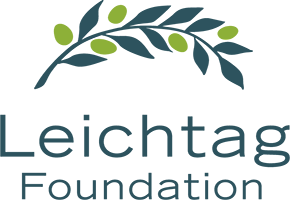
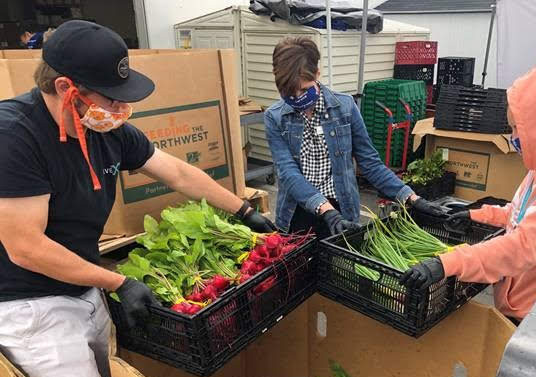
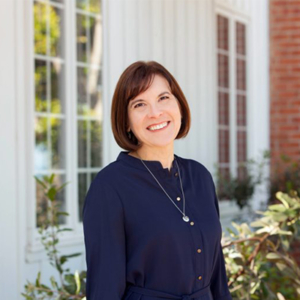


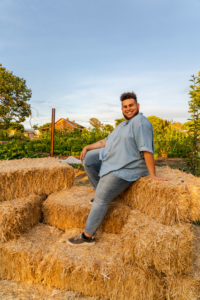 Black, Jewish and Queer. These three identities weave the fabric of who I am, but it took a long time to believe that they could exist together.
Black, Jewish and Queer. These three identities weave the fabric of who I am, but it took a long time to believe that they could exist together. Lee and Toni Leichtag established the Leichtag Foundation in 1991 following the sale of their business. Lee and Toni were lifelong entrepreneurs with a passion for innovation and for supporting talent. They believed that only with big risk comes big reward. Both born to families in poverty, Toni to a single mother, they strongly believed in helping those most in need and most vulnerable in our community. While they supported many causes, their strongest support was for young children and the elderly, two demographics who particularly lack voice in our society.
Lee and Toni Leichtag established the Leichtag Foundation in 1991 following the sale of their business. Lee and Toni were lifelong entrepreneurs with a passion for innovation and for supporting talent. They believed that only with big risk comes big reward. Both born to families in poverty, Toni to a single mother, they strongly believed in helping those most in need and most vulnerable in our community. While they supported many causes, their strongest support was for young children and the elderly, two demographics who particularly lack voice in our society.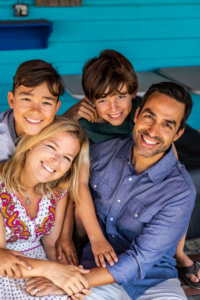 Lifelong Baltimoreans, Rabbi George and Alison Wielechowski and their sons, 11-year-old Lennon and 9-year-old Gideon, are more than pursuing the good life in Southern California. Having moved to San Diego more than three years ago, they are fulfilling a lifelong dream.
Lifelong Baltimoreans, Rabbi George and Alison Wielechowski and their sons, 11-year-old Lennon and 9-year-old Gideon, are more than pursuing the good life in Southern California. Having moved to San Diego more than three years ago, they are fulfilling a lifelong dream.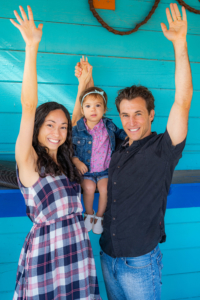
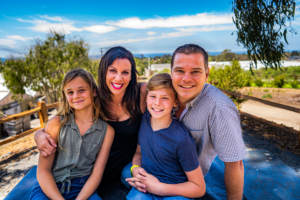
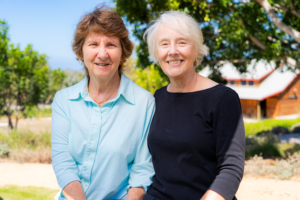

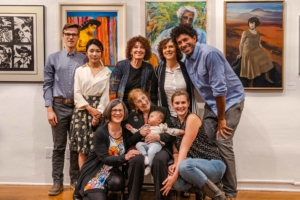
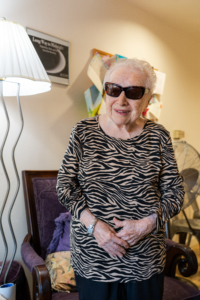
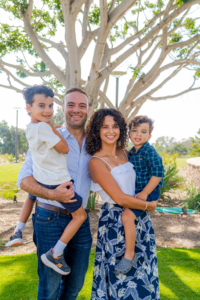
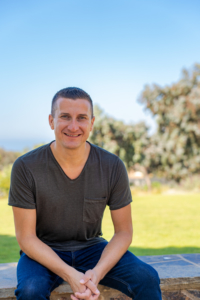 You would think that as the executive director of San Diego LGBT Pride, Fernando Zweifach López Jr., who uses the pronoun they, has done all the coming out they possibly can. A queer, non-binary individual who has worked for many years on civil rights issues, López also speaks openly and often about their father’s family, Mexican-American migrant workers who tilled the fields of rural California.
You would think that as the executive director of San Diego LGBT Pride, Fernando Zweifach López Jr., who uses the pronoun they, has done all the coming out they possibly can. A queer, non-binary individual who has worked for many years on civil rights issues, López also speaks openly and often about their father’s family, Mexican-American migrant workers who tilled the fields of rural California.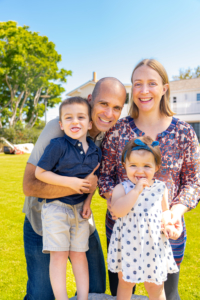 Stacie and Jeff Cook understand commitment. They live it.
Stacie and Jeff Cook understand commitment. They live it.